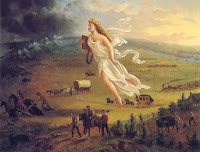One 20th-century evolutionary biologist, J. B. S. Haldane, suggested that a different type of mindset might lie behind this Coleoptera category of insects, and his comment has entered the canon of science-humor stories. After a distinguished career in biology, a reporter asked Haldane what conclusion about the mind of the Maker he had drawn from his vast, scientific knowledge of Nature. Haldane replied, "an inordinate fondness for beetles."
Indeed, there are over 400,000 species of these little creatures (almost half of all insect species), identifiable by their pair of hard forewings serving as armor. Some beetles click; some emit blinking light; some are like whirligigs. Although the word "beetle" derives from the Old English "bitela," meaning "biting," very few would bite you.
I know God did not invent beetles just to entertain us. (They and many other insects were, after all, around for at least 50 million years before hominids came along.) Nevertheless, more than one science-humor story revolves around them.
A frequently repeated anecdote is about the young Charles Darwin when he was alone, collecting beetles (one of his favorite hobbies). Spotting an unusual beetle, he picked it up, but then spotted one of a different species, which he picked up with his other hand. But then he spotted a third beetle, and so popped the second beetle into his mouth to quickly free a hand. As Darwin later recalled, "Alas, [the beetle in my mouth] ejected some intensely acrid fluid, which burnt my tongue so that I was forced to spit the beetle out." The author of a juvenile-level biography concludes this story with the straight-faced comment, "Bugs don't always do what you want them to, and not all beetles want to be caught."
It would be fun to think that God had invented Darwin's squirting beetle so that writers of biographies for youth would have a funny story to insert into their manuscript. But I expect God has larger concerns in mind than the entertainment of readers. (Even if the 19th-century novelist William Makepeace Thackeray was able to wittily turn "beetle" into a verb by saying in Vanity Fair that "Chambermaids... beetled from bedroom to bedroom loaded with... champagne.")
 No, my hunch is that the plenitude of beetle species has more to do with the strength of their body type and its adaptability to many different environments. Hopefully, our human sense of humor will remain just as strong and adaptable.
No, my hunch is that the plenitude of beetle species has more to do with the strength of their body type and its adaptability to many different environments. Hopefully, our human sense of humor will remain just as strong and adaptable.
~~~
Even if you don't know what type they were, have you ever noticed any insects around the entrance to where you live?
(The Haldane quote was in an article by G. Evelyn Hutchinson
in The American Naturalist in 1959 [93, 870]: 145-159.)
(The Darwin remembrance, originally in Life and Letters, Vol. 1, p. 43, and comment about it
are from Charles and Emma by Deborah Heiligman, © 2009. p. 24.)


